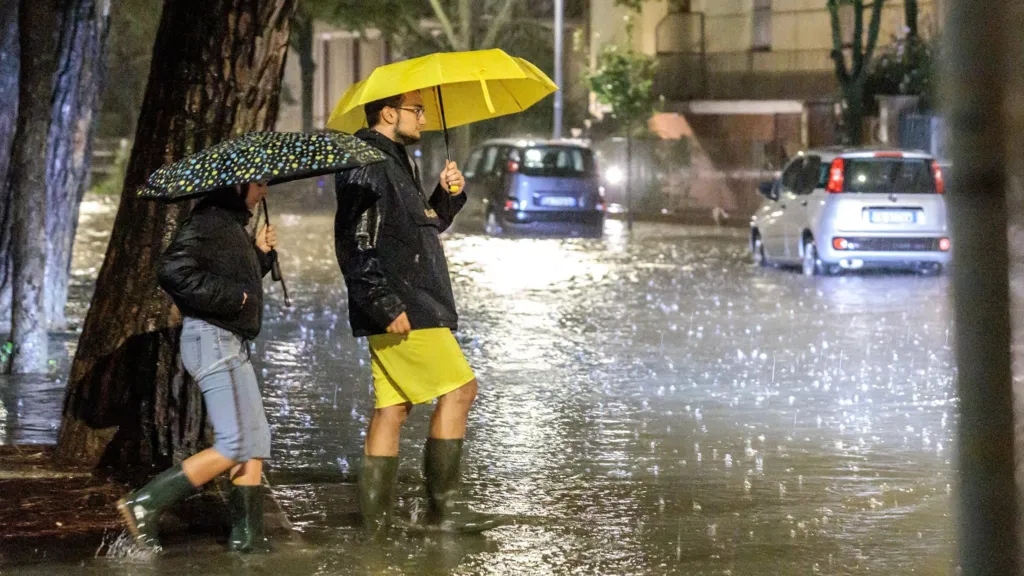Storm Boris Strikes Italy Following Devastation in Central Europe
3 min read
Faenza is one of the worst-affected cities in Emilia Romagna.

Faenza is one of the worst-affected cities in Emilia Romagna.
Storm Boris has unleashed its fury across northeastern and central Italy, just days after causing catastrophic flooding in central Europe. Over 1,000 residents in the Emilia Romagna region have been forced to evacuate, while the Marche region has reported severe flooding and widespread disruptions. Tragically, two individuals have been reported missing amid the chaos.
In response to the devastation, European Commission President Ursula von der Leyen announced a significant aid package of €10 billion (£8.4 billion) for the affected countries. This announcement came after a meeting with leaders from Poland, the Czech Republic, Slovakia, and Austria in Wroclaw, Poland, a city that has been on high alert due to rising river levels.
During a press briefing, von der Leyen stated, “Extraordinary times call for extraordinary measures,” emphasizing the urgency of the situation as Italy braced itself for the storm’s impact. Storm Boris, a low-pressure system, has swept through several countries, including Poland, the Czech Republic, Romania, and Austria, leading to at least 23 fatalities.
In Emilia Romagna, schools have closed their doors, and numerous roads have been impacted by landslides, causing severe disruptions to railway traffic. Authorities have urged residents to avoid basements and seek shelter on higher floors of their homes.
In Ravenna, public spaces such as schools, libraries, and parks have been shut down, while the University of Bologna has canceled exams and classes. Faenza, a city in the region, has faced the brunt of the storm, with rivers overflowing their banks at alarming rates. Local residents reported having to evacuate their homes using dinghies in the middle of the night, as the overflowing rivers caused sewage systems to back up.
Meanwhile, officials in Bologna reported that river levels in the city remained manageable as of Thursday morning, but a weather alert remains in effect until Friday for much of the region. Red warnings have been issued for potential flooding and landslides in eastern Emilia Romagna.
The coastal town of Falconara has recorded an astonishing 204mm (8 inches) of rain since Wednesday, surpassing the average rainfall for September of approximately 67mm. The Apennine mountain region also recorded over 300mm of rain, exacerbating the flooding risk.
Although the rain is expected to taper off by Friday and the weekend forecast appears drier, the potential for flooding remains a concern, as seen in other parts of central Europe.
For many in Emilia Romagna, the arrival of Storm Boris serves as a haunting reminder of the severe flooding that occurred just over a year ago. In May 2023, the region was devastated when nearly six months’ worth of rainfall fell within a day and a half, leading to more than 20 rivers overflowing. That disaster resulted in the loss of 13 lives, the evacuation of tens of thousands, and damage amounting to billions of euros.
While the immediate threat from Storm Boris seems to be easing across much of the region, the situation in Hungary remains precarious. The Danube River continues to rise, with Prime Minister Viktor Orban announcing that water levels in Budapest are expected to peak on Saturday. However, he reassured citizens that the levels would be lower than the record highs witnessed in 2013.
These recent events highlight growing concerns among climate scientists regarding the increasing frequency and severity of extreme rainfall as the planet warms. While it is challenging to determine the exact impact of climate change on specific events, experts have long warned that incidents like Storm Boris could become more common in a warming world.
As Italy and other affected nations begin to assess the damage and recover from Storm Boris, the need for enhanced disaster preparedness and resilient infrastructure becomes more pressing than ever. The resilience of communities will be tested as they navigate the aftermath of this latest natural disaster.